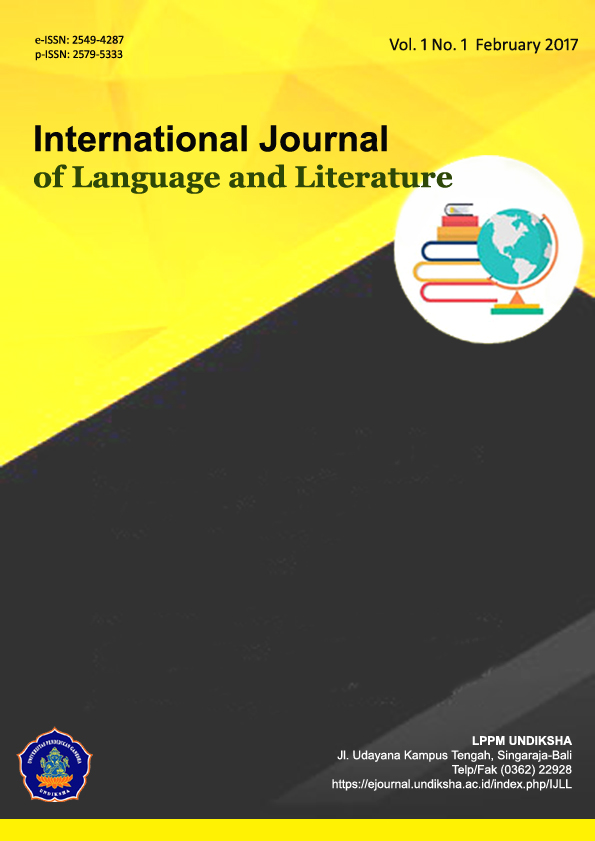LEARNERS’ PERCEPTION AND PRACTICES ON AUTONOMOUS LANGUAGE LEARNING IN EFL SETTINGS
DOI:
https://doi.org/10.23887/ijll.v5i1.32598Keywords:
learner autonomy, language learning, perceptions, practicesAbstract
This research was aimed to investigate learners’ perception and practices of understanding teachers’ teaching objectives and requirements related to autonomous language learning, setting up their objectives and study plans to autonomous language learning, and find out learners perceive in learning English autonomously. To gain a deep understanding and utilizing the objectives, the researcher employed descriptive qualitative research. The research findings were extracted through both an online questionnaire and interview. Some constraints were reported in this research, but more positive responses were still shown by the learners. They positively disposed to the notion of learner autonomy. The learners specifically showed positive attitudes toward instructors’ teaching objectives and requirements, setting up their objectives and study plans, and their practices in learning English autonomously. Further researchers, thus, need to research in various universities with a large number to gain a deeper and wider understanding about learners perceive in autonomous language learning.
References
Ahmadzadeh, R., & Zabardast, S. (2014). Learner autonomy in practice. International Journal on New Trends in Education and Their Implications, 5(4), 49-57. doi:10.1016/j.sbspro.2011.01.051. DOI: https://doi.org/10.1016/j.sbspro.2011.01.051
Amirian, S. M. (2017). An investigation into Iranian EFL teachers’ perception of learner autonomy. Journal of Language Teaching and Research, 8(4), 807-816. doi: http://dx.doi.org/10.17507/jltr.0804.22 DOI: https://doi.org/10.17507/jltr.0804.22
Ary, D., Jacobs, L. C., Sorensen, C., & Razavieh, A. (2010). Introduction to Research in Education (8th ed.). California: Wadsworth.
Bajrami, L., & Ismaili, M. (2016). The role of video materials in EFL classrooms. Procedia-Social and Behavioral Sciences, 232, 502-506. doi:10.1016/j.sbspro.2016.10.068 DOI: https://doi.org/10.1016/j.sbspro.2016.10.068
Benson, P. (2008). Teachers' and learners'perspectives on autonomy. In T. Lamb & H. Reinders (Eds)., Learner and Teacher Autonomy: Concepts, Realities, and Responses. Amsterdam: John Benjamins. DOI: https://doi.org/10.1075/aals.1.05ben
Boyce. (2010). The effectiveness of increasing language learning strategy awareness for Students studying English as a second language. (Published master thesis). Auckland University of Techology.
Chang, M.-M. (2010). Effects of Self-Monitoring on Web-Based Language Learners' Performance and Motivation. CALICO Journal, 27(2), 1-13. doi: 10.11139/cj.27.2.298-310 DOI: https://doi.org/10.11139/cj.27.2.298-310
Creswell, J. W. (2007). Qualitative inquiry and research design: Choosing among five approaches. CA: Sage.
DeMarrais, K. (2004). Qualitative interview studies: Learning through experience. Foundations for Research. Methods of Inquiry in Education and the Social Sciences, 1(1), 51-68.
Dickinson, L. (1987). Self-Instruction in language learning. Cambridge : University Press.
GENÇ, G. (2015). Autonomous Learning Capacity of EFL student teachers. International Journal of Languages’ Education and Teaching, 3(2), 23-42. DOI: https://doi.org/10.18298/ijlet.483
Green, P., & Skinner, D. (2005). “Does time management training work: an evaluation”. International Journal of Training and Development, 9, 124-139. DOI: https://doi.org/10.1111/j.1468-2419.2005.00226.x
Joshi, K. J. (2011). Learner Perceptions and Teacher Beliefs about Learner Autonomy in Language Learning. Journal of NELTA, 16(1-2), 13-29. doi:https://doi.org/10.3126/nelta.v16i1-2.6126. DOI: https://doi.org/10.3126/nelta.v16i1-2.6126
Kemala, Z. (2016). An analysis of factors influencing autonomous learners in learning English. ELTIN Journal, 4(1), 11-20.
Kenny, B. (1993). For More Autonomy. System, 21(4), 431-442. doi:10.1017/S0261444806003958 DOI: https://doi.org/10.1016/0346-251X(93)90055-L
Kumbakonam, U. R. (2017). Role of a teacher in English language teaching (ELT). International Journal of Educational Science and Research, 7(1), 1-4.
Le, Q. X. (2013). Fostering learner autonomy in language learning in tertiary education: an intervention study of university students in Hochiminh City, Vietnam. (Published Ph.D thesis). University of Nottingham.
Lengkanawati, N. S. (2017). Learner autonomy in the Indonesian EFL settings. Indonesian Journal of Applied Linguistics, 6(2), 222-231. doi:dx.doi.org/10.17509/ijal.v6i2.4847 DOI: https://doi.org/10.17509/ijal.v6i2.4847
Malik, R. S., & Hamied, F. A. (2014). Research Methods: A Guide For First Time Researcher. Bandung: UPI Press.
Mardjuki, M. S. (2018). Learner autonomy: Gender-based perception among EFL Indonesian students. Indonesian Journal of EFL and Linguistics, 3(1). doi:dx.doi.org/10.21462/ijefll.v3i1.46 DOI: https://doi.org/10.21462/ijefll.v3i1.46
Mısır, H., Koç, D. K., & Koç, S. E. (2018). An analysis of learner autonomy and autonomous learning practices in massive open online language courses. Arab World English Journal(4), 24- 39. doi:https://dx.doi.org/10.24093/awej/call4.3 DOI: https://doi.org/10.24093/awej/call4.3
Rao, Z. (2002). Chinese students’ perceptions of communicative and non-communicative activities in EFL classroom. System, 30, 80-105. DOI: https://doi.org/10.1016/S0346-251X(01)00050-1
Salimi, A., & Ansari, N. (2015). Learner autonomy: Investigating Iranian English teachers' beliefs. Theory and Practice in Language Studies, 5(5), 1106-1115. doi:http://dx.doi.org/10.5539/elt.v6n3p1 DOI: https://doi.org/10.17507/tpls.0505.28
Sanchez, N. S. (2017). Discovering students' preference for classroom activities and teachers' frequency of activity use. Colombian Applied Linguistics Journal, 19(1), 51-66. doi:10.14483/calj.v19n1.9292 DOI: https://doi.org/10.14483/calj.v19n1.9292
Vieira, F. (2007). Teacher autonomy: Why should we care. Independence, 42, 20-28.
Downloads
Published
How to Cite
Issue
Section
License
IJLL Journal provides immediate open access to its content on the principle that making research freely available to the public to supports a greater global exchange of knowledge.

This work is licensed under a Creative Commons Attribution-ShareAlike 4.0 International License







